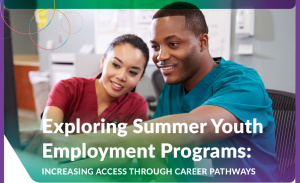In September 2022, Advance CTE and ECMC Foundation announced the second cohort of The Postsecondary State Career Technical Education (CTE) Leaders Fellowship at Advance CTE—Sponsored by ECMC Foundation. The Advance CTE — ECMCF Fellows include representation across multiple demographic categories reflecting the Fellowship’s goal of intentionally building a postsecondary leadership pipeline for underserved populations in Career Technical Education (CTE) that closes racial representation gaps and removes equity barriers to postsecondary leadership advancement.
This month, we’re excited to highlight two members of Advance CTE’s second cohort of Postsecondary State Career Technical Education (CTE) Leaders Fellows. ECMCF Fellow Davil Jackson (CA) is passionate about connecting learners with the tools and resources they need to make the most informed decisions about their futures.
 Tell me more about your journey to the Fellowship.
Tell me more about your journey to the Fellowship.
I’ve been working in employment and workforce development before I was fully aware of the terminology for this work. I’m drawn to this work because I have a passion for connecting people with resources and tools that they need to find employment. I first started working in New York at an employment development agency that specialized in medical field careers. A lot of the work was supporting 18 to 24-year-olds and individuals who had just been released from prison. After moving back to California, I was hired to coordinate a construction pre-apprenticeship program and eventually took on a role working with high school students as a career readiness specialist for a Regional Occupational Program (ROP) program. In this role, I learned more about the benefits of CTE.
I discovered this Fellowship when a mentor share the application with me, and I saw an opportunity to advance my knowledge of CTE and become a more effective resource for my community.
What skills or areas have you experienced the most growth in the program?
I have seen a lot of growth in my ability to engage with research and data analysis. This Fellowship has given me the opportunity to see how policy and research interact with practice, and as someone working locally with learners, this was an important piece of my development. Using data to tell a story and validate the need for change in policies impacting CTE will allow me to increase the impact that I’m having on my community.
Working directly with learners and local programs, I have a clear understanding of the barriers that currently exist. With this additional knowledge and skill in identifying the systems that perpetuate these barriers, I can develop policies to make significant and lasting change. With this knowledge, I’ve become more confident and prepared to take on a leadership role to grow my career.
Have you been tapped for new or more advanced roles within your organization as a result of your experience in the Fellowship?
I love my current role and the work that I’m doing to support learners. This Fellowship has shown me the ways that the skills I’m learning are preparing me for new opportunities as well. When the Fellowship started, I’d just assumed a new role as an apprenticeship career services advisor with the University of California Riverside Extension, and a few months ago, that role expanded to include employer engagement. This means I’m developing relationships with industry and business leaders to coordinate new apprenticeship opportunities. The Fellowship has given me the opportunity to build the confidence to articulate the work and the impact of this work to others. I understand how to engage in strategic planning and the processes for documenting the procedures to be replicated elsewhere.
How has your experience in the Fellowship helped you explore new spaces or positions in postsecondary state CTE leadership?
Through this Fellowship, I’ve had so much exposure to different professional development opportunities, convenings with national organizations and grant opportunities to enhance the work I’m currently doing. Exploring the field of CTE to understand how I can have the greatest impact on my community, creating connections and building my own awareness has been really powerful.
Recently, I was announced as one of the CTE Leadership Collaborative 2023 Mini Grant recipients. I applied for this grant to establish a summer youth employment program. The purpose of this work is to provide 10 high school juniors or seniors with the opportunity to explore various career fields over a two month period in the summer of 2024. The goal is to create awareness and access to CTE opportunities in underrepresented populations.
How has the Fellowship expanded your network?
The cohort’s vast knowledge and experience have been hugely beneficial. I’ve learned so much through the workshops and the speakers who come in for the panels as well. I think this experience has affirmed what I’m always stressing to the youth that I work with, and that is the value of finding a mentor or a coach to support you. It can be difficult, especially as an adult, to find someone who can provide that advice and point you in the direction of resources. I would also add that the accountability buddies within the cohort have been really helpful, especially as a safe space to work closely to give and receive project feedback every other week.


